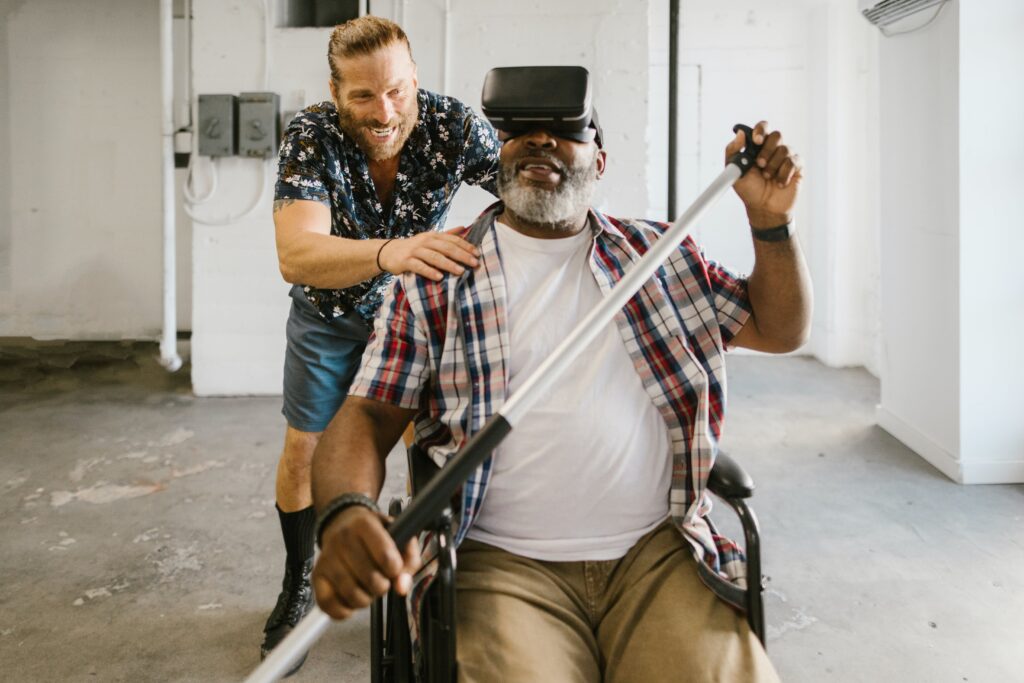Cognitive disabilities encompass a broad range of conditions affecting mental processes such as learning, memory, perception, and problem-solving. These conditions can significantly impact an individual’s ability to perform everyday tasks and interact with the world around them. For those living with a cognitive disability, or as caregivers, the challenges are multifaceted and often complex.
Traditional methods of support, while beneficial, can fall short in providing comprehensive assistance. This gap in care is where Artificial Intelligence (AI) becomes invaluable. AI, with its capacity for learning, adaptation, and decision-making, presents a groundbreaking solution to many challenges faced by individuals with cognitive disabilities.
AI’s assistance spans numerous aspects – from simplifying daily tasks to aiding communication and social interaction. AI-powered devices can provide medication reminders, assist with scheduling, and guide navigation in physical environments. In communication, AI can translate complex language into simpler terms, making information more accessible.
Personalised learning experiences, particularly beneficial in special education, are another key area where AI shines. These experiences adapt to an individual’s learning pace and style, crucial for students with cognitive impairments. AI’s potential in assisting cognitive disabilities extends further into cognitive rehabilitation, aiding individuals in regaining lost abilities.
By integrating AI in cognitive disability care, we step towards a more inclusive society. AI empowers us to create a world where cognitive disabilities are part of a person’s unique journey rather than a limitation.
AI in Special Education: Pioneering Personalised Learning
The integration of AI in special education marks a new learning epoch, particularly for students with cognitive disabilities. Traditional teaching methods often follow a one-size-fits-all approach, which can be ineffective for students with cognitive impairments. Each student has a unique learning style, and AI adapts to these individual preferences. For instance, AI-powered educational software can modify the difficulty level of tasks based on the student’s performance, ensuring an optimal learning curve that is neither too easy nor too challenging.
AI also transforms learning into a more interactive and engaging experience. Through gamified learning modules and virtual reality, AI converts abstract concepts into tangible, relatable experiences. This approach is particularly beneficial for students with cognitive disabilities, who might struggle with traditional methods.
Furthermore, AI plays a crucial role in tracking and analysing students’ progress. The insights gained from AI can inform educators about the strengths and areas for improvement of each student, allowing them to tailor their teaching methods effectively.
The integration of AI in special education is revolutionary. It enhances the learning experience for students with cognitive disabilities and empowers educators with valuable tools and insights. However, AI complements rather than replaces the human element in education – the role of educators in fostering emotional and social development remains vital.
AI Assistive Technology: Transforming Cognitive Support
AI in assistive technology is redefining support for individuals with cognitive disabilities. AI-powered assistive technology offers personalised assistance, adapting to the unique needs and abilities of each individual. Smart home devices powered by AI can manage daily tasks, providing reminders and controlling home appliances, thereby learning from the user’s behaviour and preferences to offer tailored support.
In communication, AI facilitates more effective interactions. AI-powered speech recognition and text-to-speech technologies enable individuals with cognitive disabilities to communicate more effectively. These technologies can simplify complex language and assist in expressing thoughts and emotions, bridging communication gaps.
Moreover, AI aids in navigation, both in digital spaces and physical environments. AI-powered applications provide step-by-step directions, identify obstacles, and suggest alternative routes, enhancing spatial awareness for those with cognitive challenges.
The integration of AI in assistive technology significantly improves the quality of life for individuals with cognitive disabilities, offering a level of independence and autonomy that traditional technologies may not provide. However, the human element remains crucial. AI should be seen as a complement to human support, not a replacement.
Exploring the Impact of Artificial Intelligence on Cognitive Rehabilitation
Cognitive rehabilitation, vital for individuals with cognitive disabilities, involves therapies and activities designed to improve cognitive functions like memory, attention, and problem-solving. AI’s potential to revolutionise cognitive rehabilitation lies in its ability to offer personalised and adaptive therapies. Traditional methods, often repetitive, are transformed into engaging and interactive experiences with AI, such as AI-powered virtual reality simulations of real-world scenarios.
AI adapts these therapies based on individual progress, ensuring they remain challenging yet achievable. This personalised approach significantly enhances cognitive rehabilitation’s effectiveness. AI also assists therapists by providing insights into an individual’s progress, enabling them to tailor their approach.
The integration of AI in cognitive rehabilitation represents a promising development, making therapies more effective and personalised. However, the role of human therapists remains irreplaceable in providing emotional support and guidance.
AI-Enhanced Cognitive Therapy: A Paradigm Shift in Treatment Approaches
Cognitive therapy, fundamental in treating various cognitive disabilities, is undergoing a significant transformation with the advent of AI. This integration of AI into cognitive therapy marks a paradigm shift, offering innovative approaches that could revolutionize how therapy is delivered and experienced.
More than just automation, AI in cognitive therapy focuses on personalisation and adaptability. Traditional cognitive therapy often employs a standardised approach, which might not address the unique challenges and needs of each individual. AI steps in to fill this gap, offering customised therapy experiences that adapt in real-time to the individual’s responses and progress. This adaptability ensures that therapy is always aligned with the person’s current cognitive state, maximising its effectiveness.
One of the most promising applications of AI in cognitive therapy is in the area of mental health, particularly in treating conditions like depression, anxiety, and PTSD. AI-powered therapy apps and online platforms use algorithms to provide therapeutic guidance, simulate conversations, and offer coping mechanisms. These AI solutions can be accessed anywhere and anytime, breaking down barriers to traditional therapy such as geographical limitations or the stigma associated with seeking mental health treatment.
Moreover, AI plays a pivotal role in cognitive-behavioural therapy (CBT), enhancing its delivery through personalised mental health exercises and interactive sessions. AI systems can track an individual’s progress, adjust therapy modules based on their response, and provide real-time feedback. This ongoing assessment ensures that the therapy remains relevant and effective, facilitating faster and more sustainable recovery.
AI also revolutionises cognitive therapy by introducing immersive technologies like virtual reality (VR). VR-based cognitive therapy, powered by AI, can create simulated environments for exposure therapy, relaxation exercises, and social skill training. This immersive experience is particularly beneficial for individuals who need a safe space to confront and work through their fears or anxieties.
The impact of AI on cognitive therapy extends beyond treatment effectiveness, it also offers scalability and consistency. AI-enabled therapies ensure that high-quality, evidence-based therapy is accessible to a larger population, democratizing mental health care. However, the role of human therapists remains vital. AI supplements the therapist’s work, providing them with additional tools and insights, but cannot replace the human touch, empathy, and understanding that therapists bring.
Expanding Horizons
AI’s role in cognitive disability assistance is vast, encompassing areas from special education to cognitive rehabilitation. AI is reshaping the landscape of disability care, making it more inclusive and adaptive. AI applications in cognitive therapy offer personalised, accessible treatments that can be adjusted based on individual feedback, significantly increasing the reach and impact of cognitive therapy services.
In essence, AI’s integration in cognitive disability care is transformative. It enhances the effectiveness, personalisation, and accessibility of support. AI is a tool reshaping the disability care landscape, fostering a more inclusive and adaptive environment. However, AI complements human support; the roles of caregivers, educators, and therapists remain crucial.
As we continue to explore AI’s potential, we step into a future where cognitive disabilities are integrated into an individual’s journey, empowering them to reach their full potential.






 James
James 

